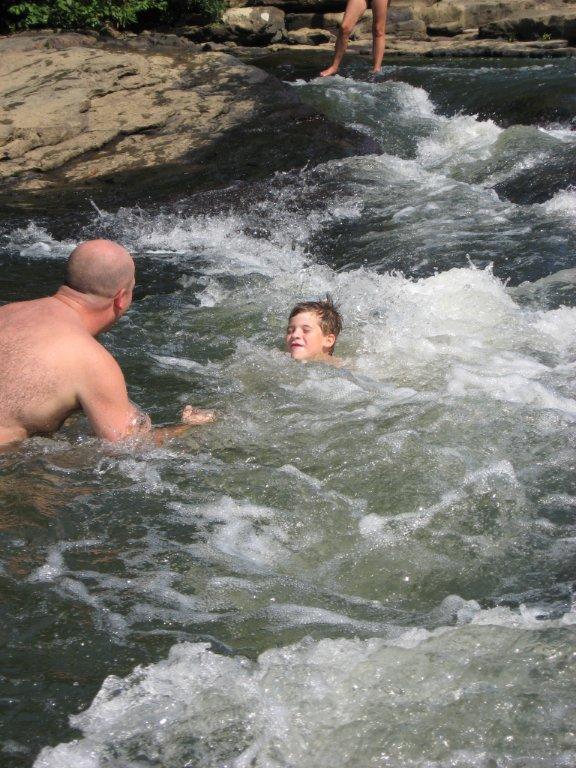Leading Children by Still Waters
Last summer, several families at Camp Christian walked to a nearby stream. The  fast moving rapids of the stream had carved out and smoothed the surface of a natural slide that ended in a pool at the bottom of a small waterfall. You could sit at the top of the “slide” and allow the rapids to carry you downstream and over the waterfall into the pool. Everyone loved it. We had a great time “riding the miniature rapids” and being “dumped” over the waterfall into the deeper water. The young people (children and teens) loved riding the rapids and landing at the bottom of the falls. They slid down the rapids, ran back to the top, sat down and started over again…and again…and again. They loved the thrill. They did not want to stop, let alone leave and return to camp. If allowed, I think they would have continued playing in the rapids until they collapsed from exhaustion.
fast moving rapids of the stream had carved out and smoothed the surface of a natural slide that ended in a pool at the bottom of a small waterfall. You could sit at the top of the “slide” and allow the rapids to carry you downstream and over the waterfall into the pool. Everyone loved it. We had a great time “riding the miniature rapids” and being “dumped” over the waterfall into the deeper water. The young people (children and teens) loved riding the rapids and landing at the bottom of the falls. They slid down the rapids, ran back to the top, sat down and started over again…and again…and again. They loved the thrill. They did not want to stop, let alone leave and return to camp. If allowed, I think they would have continued playing in the rapids until they collapsed from exhaustion.
 fast moving rapids of the stream had carved out and smoothed the surface of a natural slide that ended in a pool at the bottom of a small waterfall. You could sit at the top of the “slide” and allow the rapids to carry you downstream and over the waterfall into the pool. Everyone loved it. We had a great time “riding the miniature rapids” and being “dumped” over the waterfall into the deeper water. The young people (children and teens) loved riding the rapids and landing at the bottom of the falls. They slid down the rapids, ran back to the top, sat down and started over again…and again…and again. They loved the thrill. They did not want to stop, let alone leave and return to camp. If allowed, I think they would have continued playing in the rapids until they collapsed from exhaustion.
fast moving rapids of the stream had carved out and smoothed the surface of a natural slide that ended in a pool at the bottom of a small waterfall. You could sit at the top of the “slide” and allow the rapids to carry you downstream and over the waterfall into the pool. Everyone loved it. We had a great time “riding the miniature rapids” and being “dumped” over the waterfall into the deeper water. The young people (children and teens) loved riding the rapids and landing at the bottom of the falls. They slid down the rapids, ran back to the top, sat down and started over again…and again…and again. They loved the thrill. They did not want to stop, let alone leave and return to camp. If allowed, I think they would have continued playing in the rapids until they collapsed from exhaustion.I had a great time, too. However, by the time we walked back to camp, I was exhausted…and ready to take a break. I would not want to play in the rapids all the time. I mean, they were fun to ride and fun to play in, but I like to lay back and relax, too. While we played in the rapids, I could not put my head back and relax. I could not stretch out on the surface of still waters and let the sun warmed my body. Instead, I had to stay alert to make sure everyone was safe, keep paddling so I did not get washed downstream, and vigilantly guard against smashing a toe (or head) against a rock. It was great fun, but not calm and relaxing.
 Family life can be this way. We all have times of riding the rapids in our family life. We get swept away with busy schedules, activities, deadlines, and demands. Even our children find themselves caught up in the rapids of an overly busy schedule filled with sports, music, friends, church activities, work, chores, etc. Many times, our children do not even realize they are over scheduled. They are merely enjoying the thrill of the ride. They are excited to see their friends, play the game, hear the concert, and help at church…. In the midst of this busy schedule, we notice them becoming more irritable, restless, and even angry. As a result, a simple irritation suddenly sparks an angry outburst that ends in yelling, door slamming, and more frustration as we run to the next activity. Before long, our kids collapse from exhaustion; and, they have no idea why.
Family life can be this way. We all have times of riding the rapids in our family life. We get swept away with busy schedules, activities, deadlines, and demands. Even our children find themselves caught up in the rapids of an overly busy schedule filled with sports, music, friends, church activities, work, chores, etc. Many times, our children do not even realize they are over scheduled. They are merely enjoying the thrill of the ride. They are excited to see their friends, play the game, hear the concert, and help at church…. In the midst of this busy schedule, we notice them becoming more irritable, restless, and even angry. As a result, a simple irritation suddenly sparks an angry outburst that ends in yelling, door slamming, and more frustration as we run to the next activity. Before long, our kids collapse from exhaustion; and, they have no idea why. We, as parents, need to lead our children into some still waters. We need to help them find the balance between time in the rapids and time relaxing. Having the proper amount of rest and relaxation actually increases our level of energy. It enhances our immune system which can result in fewer illnesses. Rest and relaxation also increases our problem-solving ability and our ability to concentrate, translating into better school performance. Getting the proper amount of rest results in decreased stress and more balanced emotions. This, in turn, translates into fewer angry outbursts, less irritability, less depression, and more enjoyment. To obtain these benefits, our children need to have time away from the rapids and time resting in the still waters of life. Here are 4 ways to lead our children to still waters. 

1. Model appropriate rest and relaxation in your own life. Children learn by watching your example. Balance your own schedule. Don’t overbook. Allow yourself time to relax. Let your children relax with you.
2. Monitor your children’s schedule. Keep an eye on your children’s schedule and talk to them about scheduling. Take the time to discuss what adding “just one more thing” to a schedule actually means. Discuss how an activity impacts the whole family. Explain that a one hour activity means more than simply one hour of time–it also includes preparation time, practice time, travel time, and “down time” for other family members (like siblings) who might be there but are not involved as well as financial costs and the time needed to obtain that cost.
3. Set healthy limits on the number of activities each family member is allowed to participate in at one time. Discuss this limit with your children. Explain the impact of overscheduling on you, them, and the family. Give them examples of times that overscheduling resulted in more stress, emotional turmoil, and maybe even illness. Explain the benefits of rest as well. Let them know it’s OK to rest and relax. Discuss what choices are available for activities and what each option involves. Finally, include your children in the final decision identifying which activities to participate in.
4. Develop a philosophy of rest. Our society often looks down on rest. Society belittles rest and calls those who relax lazy or unmotivated. In our culture, we believe that our worth is determined by activity and accomplishment. As parents who see the importance of rest and want to lead their children to still waters, we need to have a philosophy of rest. We need to be able to explain the benefits of rest in areas as diverse as creativity, problem-solving, energy management, building muscle, skill-enhancement, emotional management, improving relationships, overall health, and even sleep.